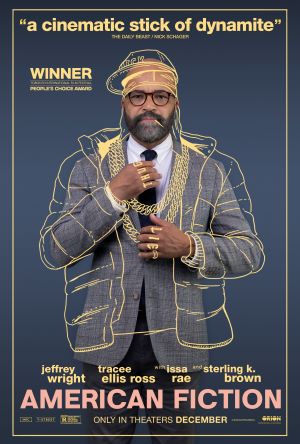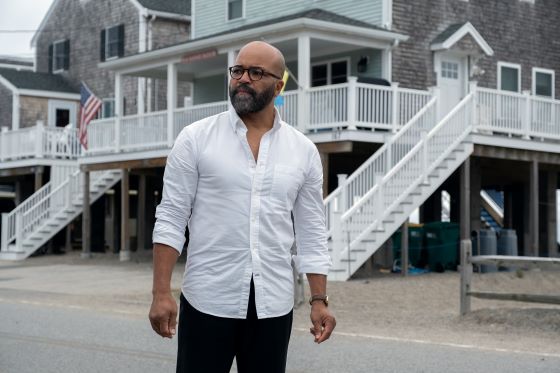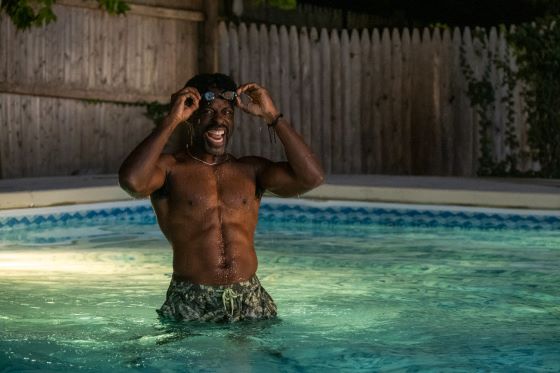

[Rating: Solid Rock Fist Up]
In Theaters Friday, January 5
A veritable Russian nesting doll of satire, broad comedy, familial reckoning, and racial commentary wrapped up in a meta wink, there’s more to American Fiction than meets the eye. This seems altogether appropriate, too, as this is a movie about exploiting the innate bias and perceptions of audiences, and director/co-writer Cord Jefferson never loses sight of this through all the twists and turns the story takes with hairpin precision. And while the movie isn’t always able to wrangle it’s A- and B-plots into thematic unison, timely concepts, clever writing, and impeccable casting smooth over any rough edges.
Writer and academic Thelonious “Monk” Ellison (Jeffrey Wright) is going through a rough patch early in American Fiction, struggling as he is to keep his head above water in a world that’s filling up faster than he can tread. Middle aged and single, Monk’s books aren’t selling, his family is in disarray, and maybe worst of all, he’s not suitably black enough according to his students, colleagues, and agent. When a personal tragedy strikes and finances get even tighter, Monk begins to lash out in a very … particular way.
Inspired by the newly popular street-speak urban fiction of fellow black writer Sintara Golden (Issa Rae), Monk has a few whiskeys and hammers out what is in effect a parody of all the most cliché and redundant African-American tropes in Hollywood. Yet what starts as a joke turns into a six-figure advance offer and a multimillion-dollar movie option, which all flow from an understanding that Monk’s newest manuscript is semi-autobiographical and written by a fictional author/fugitive. Desperately in need of money to resolve family issues that aren’t made any easier by sister Lisa (Tracee Ellis Ross), brother Clifford (Sterling K. Brown), and mother Agnes (Leslie Uggams), Monk allows himself to get swept up in the ruse as it continues to spiral out of his control.

Audiences who watched the trailer for American Fiction would recognize this movie, yet they might be surprised that the fake-author portion is really just the secondary story to Monk’s exploration of his role as a brother, son, boyfriend, and African American. Funny as the book foibles are, they are more of a launching pad to access the root of Monk’s problems in all aspects of his life, and to talk about the ways people make up fictions for themselves. Entertaining as it is, American Fiction is the best version of itself when it peels back the artifice surrounding its characters to reveal the truths they are concealing (and why).
Monk claims to not “see” race, yet as Sintara comments late in the movie (in Rae’s only meaningful scene), his outlook is informed by a preconception about potential, and what he thinks the African American community can or should be. Less concerned about how the world treats black people and more preoccupied with how that community is perceived, a big part of what Monk learns throughout the course of the film relates to his misplaced conceptions about modern American society and his role in it. And while a new, burgeoning romance with neighbor Coraline (Erika Alexander) hints at this growth, Jefferson and the script make this explicit and dynamic in Brown’s scenes.
Clifford is the divorced, regressing, newly-out-of-the-closet younger brother who by any reasonable measure is the hottest of hot messes, yet Brown plays him with a fearless sturdiness that is the perfect counter to Wright’s bottled-up curmudgeon. Without going too deeply into the 3rd act and spoiler territory, Brown is the movie’s thematic decoder ring, its templar. Along with Ross, he’s also just a flat-out scene-stealer every time he appears on-screen, and adds the perfect balance of humor and humanity to a script that needs both in equal measure to keep its story’s twin engines purring along.

It would have been nice to see a little more out of Issa Rae, and Wright is often the secondary focal point in his scenes, yet while disappointing at first, both sacrifices are wholly unselfish and serve the movie and its trajectory well. Cord Jefferson, Production Designer Jonathan Guggenheim, and D.P. Cristina Dunlap also deserve credit for the look of American Fiction, which makes great use of both the beachside exteriors of Scituate, MA as well as the New England architecture featured in the houses where the meatiest drama takes place. The juxtaposition of lived-in spaces packed with history against the sterile offices where deals are struck under the burden of politics and expectation is stark, and allows the viewer the comfort of always knowing where they are and who they are with.
The dramatic crescendo of the movie is appropriate, clever, and anticlimactic in equal measure, yet like Jefferson’s work on The Good Place, it demonstrates the deliberate intent and consideration of everything that precedes it. This is a relief in the era of storytelling by committee and the poster-first story-second content factory behind so many films (even this deep into Oscar season). And maybe that’s what helps American Fiction land as well as it does, for if it’s nothing else, it is a refutation of that and any kind of performative art that claims to serve something or someone without listening to them.





Comments on this entry are closed.